Most people know creatine as a muscle-building supplement, but this compound does much more than boost physical performance. When someone takes creatine, it crosses into the brain and helps supply energy to brain cells, which may improve thinking and mental performance, especially when the brain is under stress.
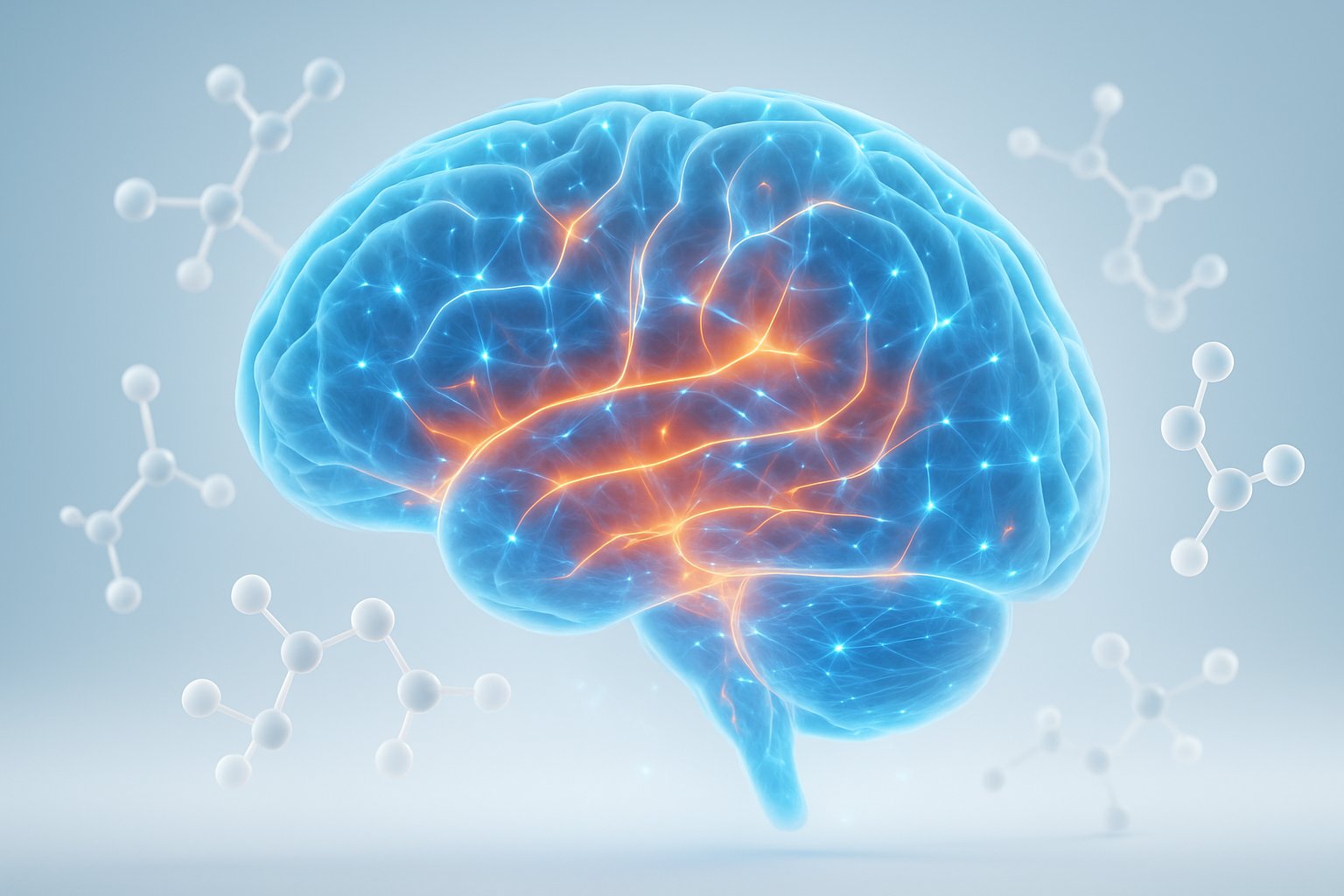
Research shows that creatine works in the brain similar to how it works in muscles. It helps brain cells make more ATP, which is the main energy source all cells need to function. This extra energy appears most helpful for people who are sleep-deprived, older adults, or those with certain brain conditions.
The brain benefits of creatine are still being studied, but early findings suggest it might help with memory, focus, and mental fatigue. However, studies show creatine has no significant effect on young healthy people[1] in normal situations, meaning it mainly helps brains that are already working extra hard.
Key Takeaways
- Creatine boosts brain energy by helping cells make more ATP, which may improve thinking when the brain is stressed or fatigued
- The supplement appears most beneficial for older adults, sleep-deprived people, and those with brain conditions rather than healthy young adults
- Research suggests creatine may help with memory and focus, but more studies are needed to confirm long-term brain benefits
How Creatine Works in the Brain
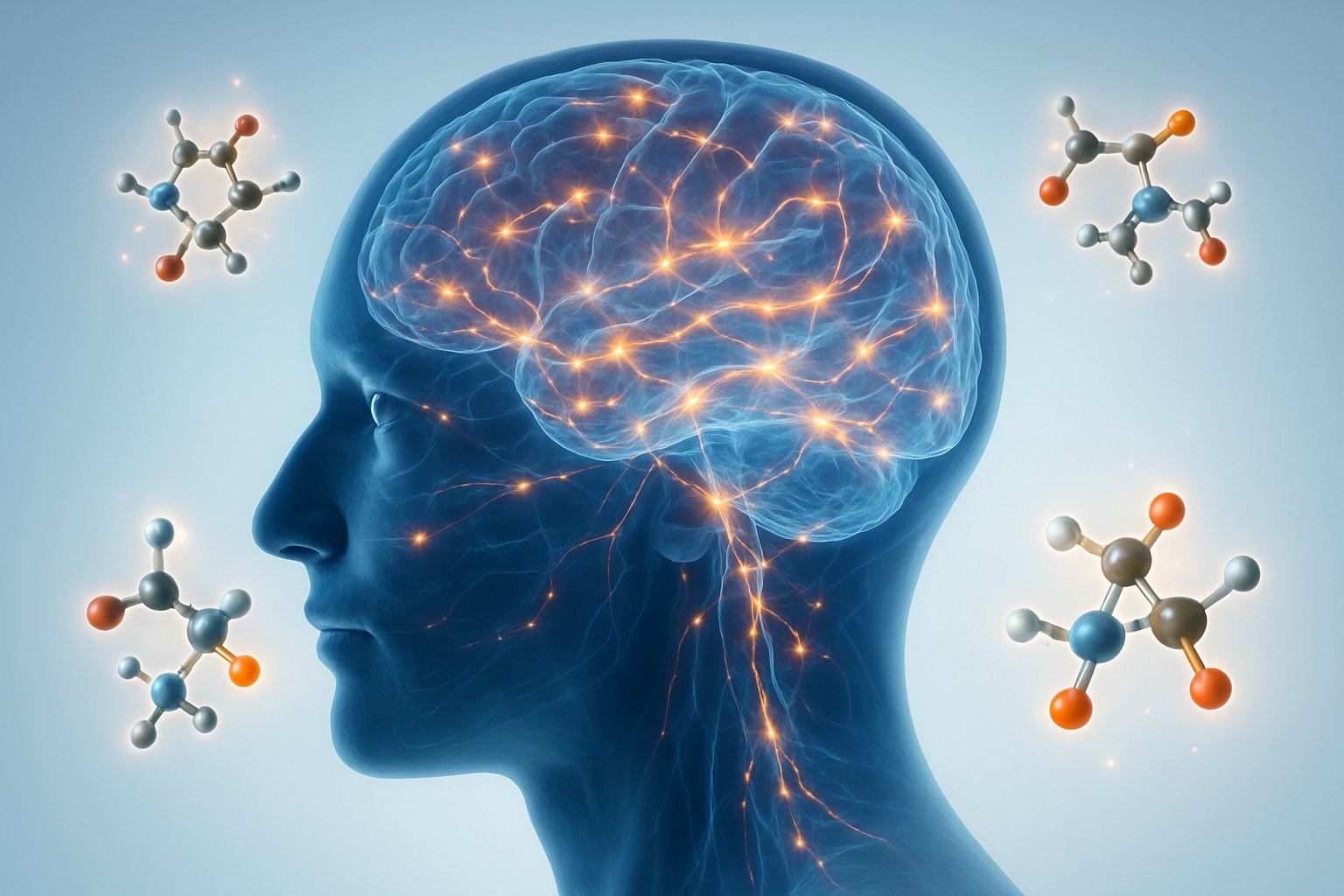
Creatine functions as an energy buffer system in brain cells, helping maintain steady ATP levels during periods of high mental demand. The brain requires constant energy to power neurons, and creatine provides a rapid backup system when standard energy production cannot keep up.
Cellular Energy and ATP Production
Brain cells need adenosine triphosphate (ATP) to function properly. ATP serves as the primary energy currency for all cellular processes in the brain.
When neurons fire, they consume large amounts of ATP quickly. The brain must constantly produce new ATP to replace what gets used up during thinking, memory formation, and other mental tasks.
Creatine helps bridge the gap between energy demand and supply. It stores energy in the form of phosphocreatine, which can rapidly regenerate ATP when brain cells need it most.
The mitochondria in brain cells produce most of the ATP through normal metabolism. However, this process takes time and cannot always keep up with sudden increases in energy demand.
Energy Production Methods:
- Primary: Mitochondrial ATP synthesis (slower but sustained)
- Secondary: Phosphocreatine system (rapid but limited)
- Emergency: Glycolysis (less efficient backup)
Phosphocreatine’s Role in Neuronal Activity
Phosphocreatine acts as an immediate energy reserve in brain tissue. When ATP levels drop during intense neural activity, phosphocreatine quickly donates its phosphate group to regenerate ATP.
This process happens within milliseconds. The speed allows neurons to maintain function even during periods of high energy demand.
Brain creatine levels directly impact how well this system works. Research shows a correlation between brain creatine amounts and cognitive performance[1].
The phosphocreatine system becomes especially important during mental stress or fatigue. It helps maintain neural function when the brain faces challenging cognitive tasks.
Phosphocreatine Cycle:
- Creatine + ATP → Phosphocreatine + ADP
- Phosphocreatine + ADP → Creatine + ATP
- Process repeats as needed
Creatine Uptake by the Brain
The brain must import creatine from the bloodstream through specialized transport proteins. These transporters move creatine across the blood-brain barrier into brain tissue.
Only small amounts of creatine typically cross into the brain. This limited uptake explains why cognitive studies often use doses of 20 grams or more[1] compared to the 5 grams used for muscle benefits.
The brain also produces some creatine internally through its own synthesis pathways. However, this internal production may not meet all the brain’s creatine needs during periods of stress.
Creatine monohydrate supplements can increase brain creatine levels over time. The process requires consistent supplementation because the transport system works slowly.
Age and health status affect how well the brain takes up creatine. Older adults and people with certain medical conditions may have different uptake rates than healthy young individuals.
Cognitive Benefits of Creatine Supplementation
Creatine supplementation provides energy support to brain cells, which can lead to measurable improvements in several key cognitive areas. Research shows specific benefits for memory formation, sustained attention, working memory capacity, and resistance to mental exhaustion.
Enhancement of Memory and Learning
Memory formation requires significant energy from brain cells. Creatine helps supply this energy by increasing phosphocreatine levels in neural tissue.
Studies show creatine supplementation can improve both short-term and long-term memory performance. Adults taking creatine often show better recall of word lists and number sequences.
The supplement appears most effective for complex learning tasks. These activities demand high energy from the hippocampus, the brain region responsible for forming new memories.
Research indicates creatine supplements could enhance cognitive function[1] in older adults who may experience natural declines in brain energy production. Younger adults also show memory improvements, especially during mentally demanding periods.
The typical effective dose ranges from 3-5 grams daily. Benefits usually appear after 1-2 weeks of consistent use.
Improvements in Attention and Focus
Sustained attention requires steady energy supply to the prefrontal cortex. Creatine supplementation helps maintain this energy flow during extended mental tasks.
People taking creatine often report improved focus during work or study sessions. They can concentrate for longer periods without experiencing the usual mental drift.
Research shows particular benefits for tasks requiring:
- Selective attention (filtering out distractions)
- Sustained vigilance (maintaining focus over time)
- Divided attention (handling multiple tasks)
Sleep-deprived individuals show the most dramatic attention improvements with creatine use. The supplement helps compensate for the reduced brain energy that occurs with inadequate rest.
Working Memory Support
Working memory allows people to hold and manipulate information temporarily. This cognitive function depends heavily on energy-intensive brain networks.
Creatine supplementation can increase working memory capacity. Users often perform better on tasks requiring them to remember and process information simultaneously.
Common working memory improvements include:
- Better mental math performance
- Improved reading comprehension
- Enhanced problem-solving speed
The supplement appears particularly helpful for complex cognitive tasks that strain working memory resources. People report feeling more mentally agile when handling multiple pieces of information.
Brain imaging studies show increased activity in working memory regions after creatine supplementation. This suggests improved energy availability in these critical neural networks.
Reduced Effects of Mental Fatigue
Mental fatigue occurs when brain energy stores become depleted during cognitive work. Creatine helps maintain these energy reserves for longer periods.
People taking creatine often experience delayed onset of mental exhaustion. They can maintain peak cognitive performance for extended periods without the usual decline.
The supplement proves especially beneficial during:
- Long work sessions
- Intensive study periods
- Sleep deprivation
- High-stress situations
Creatine for brain health[2] shows promise for maintaining mental sharpness when cognitive demands increase. Users report feeling more mentally resilient throughout challenging days.
The anti-fatigue effects appear within 1-2 weeks of starting supplementation. Most people notice they can think clearly for longer periods before experiencing mental tiredness.
Creatine and Brain Health Under Stress
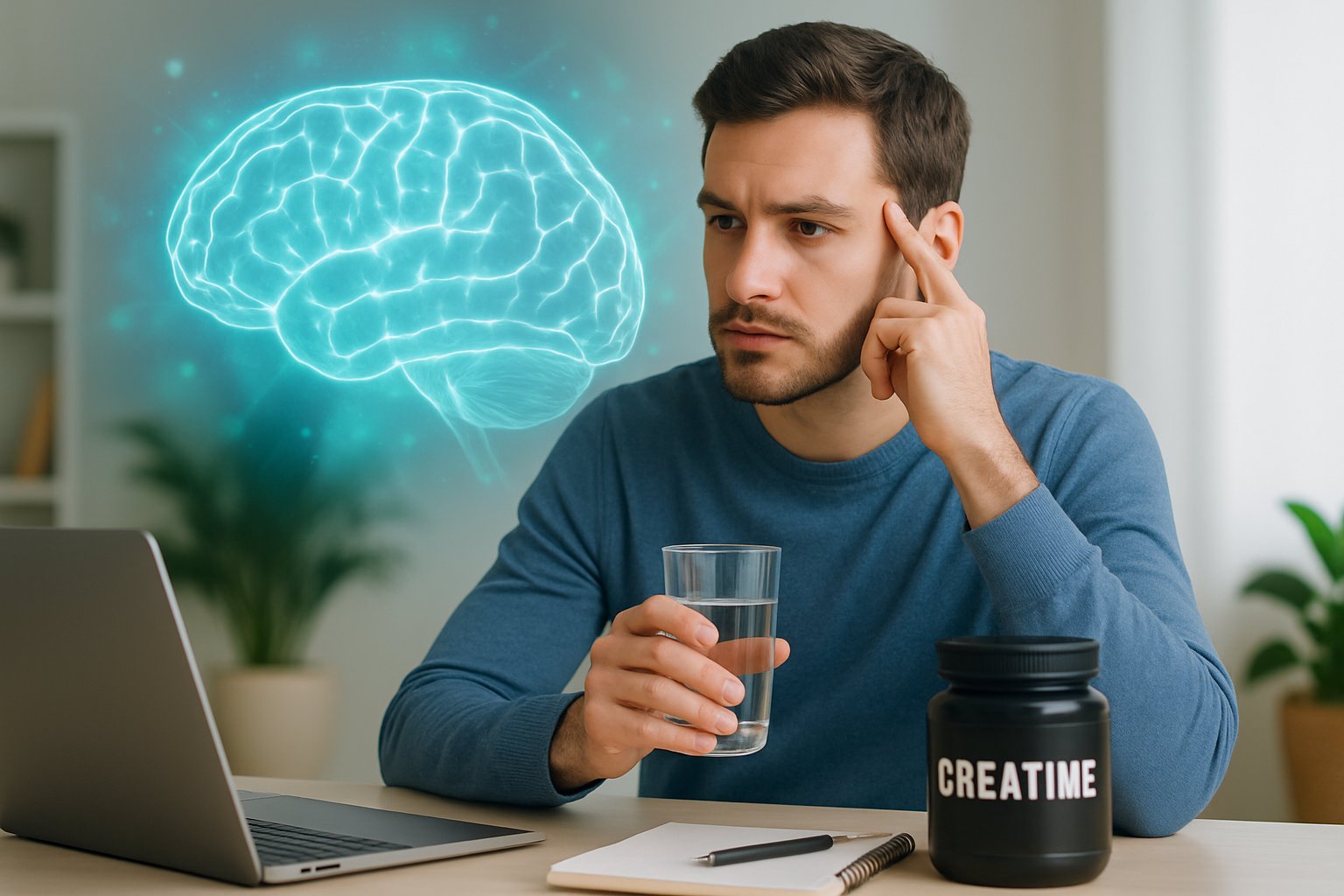
Creatine shows the strongest cognitive benefits when the brain faces stress from sleep loss, mental fatigue, or demanding tasks. Research demonstrates that stressed brains respond better to creatine supplementation[1] than healthy, rested brains.
Managing Sleep Deprivation
Sleep deprivation creates significant energy deficits in brain cells. When people stay awake for extended periods, their neurons struggle to maintain normal ATP levels.
A German study tested whether creatine could help fatigued brains[1] after sleep loss. Researchers kept 15 participants awake all night, then gave half of them 35 grams of creatine.
The sleep-deprived participants who took creatine showed better cognitive performance compared to those who received a placebo. Their brains also displayed fewer signs of fatigue-related changes.
This suggests that creatine provides backup energy when sleep deprivation disrupts normal brain function. The supplement may help shift workers, medical professionals, or students maintain mental sharpness during periods of sleep loss.
Key benefits for sleep-deprived brains:
- Improved cognitive performance
- Reduced fatigue-related brain changes
- Better energy supply to stressed neurons
Supporting Performance During Fatigue
Mental fatigue occurs when the brain’s energy systems become overwhelmed. This happens during intense cognitive work, prolonged concentration, or stressful situations.
Creatine helps by providing an additional energy source for overworked neurons. Research shows that creatine makes up for overworking the brain[1] rather than enhancing normal brain function.
The supplement appears most effective when mental demands exceed the brain’s typical energy capacity. People experiencing chronic fatigue or engaging in cognitively demanding tasks may see the greatest benefits.
Studies indicate that higher doses may be necessary for cognitive effects. While athletes typically take 5 grams daily, brain health research often uses 20-30 grams to ensure adequate delivery across the blood-brain barrier.
Mental fatigue scenarios where creatine may help:
- Extended periods of concentration
- High-stress work environments
- Cognitive overload situations
Resilience to Mental Stress
Mental stress creates metabolic demands that can exhaust brain energy reserves. Creatine supplementation may help the brain maintain function during these challenging periods.
Research suggests that people with stressed brains respond better to creatine than healthy individuals. A 2024 review found that creatine supplementation had no significant effect on young healthy participants[1] in unstressed situations.
The supplement appears to provide a buffer against stress-induced cognitive decline. This protective effect may be particularly valuable for people facing chronic stress or demanding life circumstances.
Elderly individuals, people with health conditions that limit oxygen intake, and those experiencing ongoing mental pressure may see the most significant improvements in cognitive resilience.
Stress-related factors that may improve with creatine:
- Age-related cognitive decline
- Oxygen-limited conditions
- Chronic mental pressure
- Neurodegenerative risk factors
Neuroprotective Effects and Mental Health
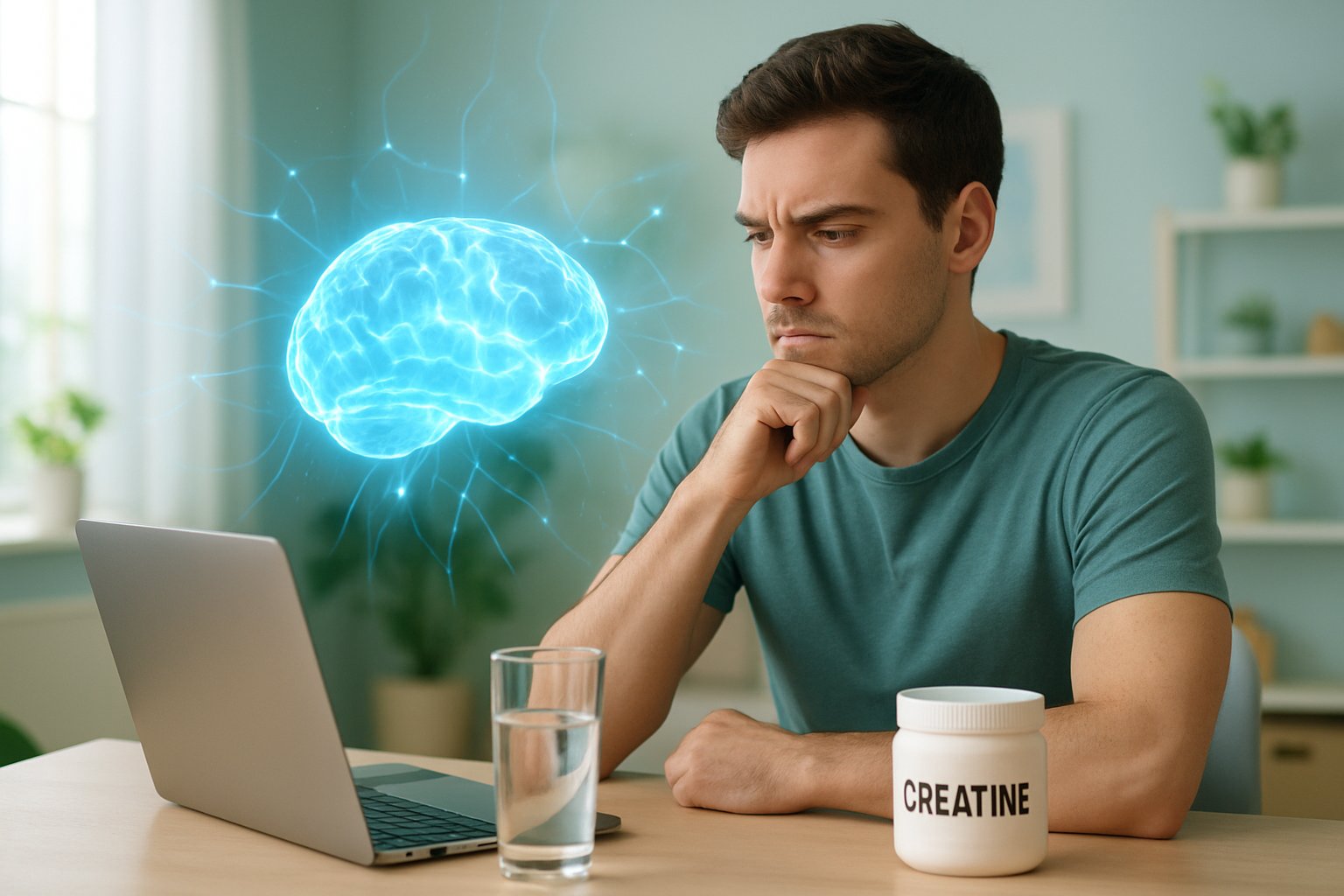
Creatine provides significant brain protection by supporting cellular energy production and reducing oxidative stress. Research shows creatine’s role in improving mood, brain energy metabolism, and psychiatric treatment effectiveness[3], particularly in depression and bipolar disorder.
Potential for Neurodegenerative Disease Prevention
Creatine supplementation may help protect against neurodegenerative diseases by enhancing brain energy metabolism. The supplement works by maintaining ATP levels in brain cells during times of stress.
Animal studies show promising results for conditions like Parkinson’s disease. In mouse models, high-dose creatine reduced dopamine loss from 56% to 33% in untreated versus treated animals.
The neuroprotective effects come from several mechanisms:
- Enhanced mitochondrial function – Better energy production in brain cells
- Reduced oxidative stress – Less cellular damage from free radicals
- Stabilized cell membranes – Protection against cell death
However, these benefits have not consistently translated to human studies. More research is needed to determine optimal dosing and effectiveness for preventing neurodegenerative diseases in people.
Support for Depression and Mood Disorders
Creatine shows significant promise for treating depression and other mood disorders. Early research indicates high doses of the supplement could improve cognition in people whose brains are stressed[1].
Studies demonstrate that creatine can enhance traditional depression treatments. When added to cognitive behavioral therapy, creatine produced greater reductions in depression scores compared to therapy alone.
Key findings for mental health:
| Condition | Effect | Study Results |
|---|---|---|
| Depression | Enhanced treatment response | Improved PHQ-9 scores with CBT |
| SSRI treatment | Better medication response | Enhanced outcomes in women |
| Brain energy | Increased phosphocreatine levels | Better mood regulation |
The brain uses about 20% of the body’s energy despite being only 2% of body weight. Depression may involve energy deficits in specific brain regions that control mood and thinking.
Creatine helps by rapidly restoring ATP during high-energy brain activities. This is especially important for complex cognitive processes involved in therapy and emotional regulation.
Neuroprotection After Brain Injury
Creatine provides substantial protection against traumatic brain injury and concussion damage. Animal research shows creatine can reduce brain tissue damage by up to 50% following injury.
The supplement works by maintaining energy supplies to injured brain cells. When the brain experiences trauma, cells struggle to produce enough ATP for basic functions.
Protective mechanisms include:
- Maintaining ATP levels during energy crisis
- Reducing calcium buildup in damaged cells
- Preventing harmful reactive oxygen species formation
- Supporting mitochondrial membrane stability
In rat studies, animals receiving creatine before brain injury showed significantly less cortical damage. The protective dose was equivalent to about 35-70 grams daily for a 70-kilogram human.
These findings suggest creatine might help athletes and others at risk for head injuries. However, human studies are still limited, and more research is needed to establish proper dosing protocols for brain injury prevention and recovery.
Underlying Biological Mechanisms
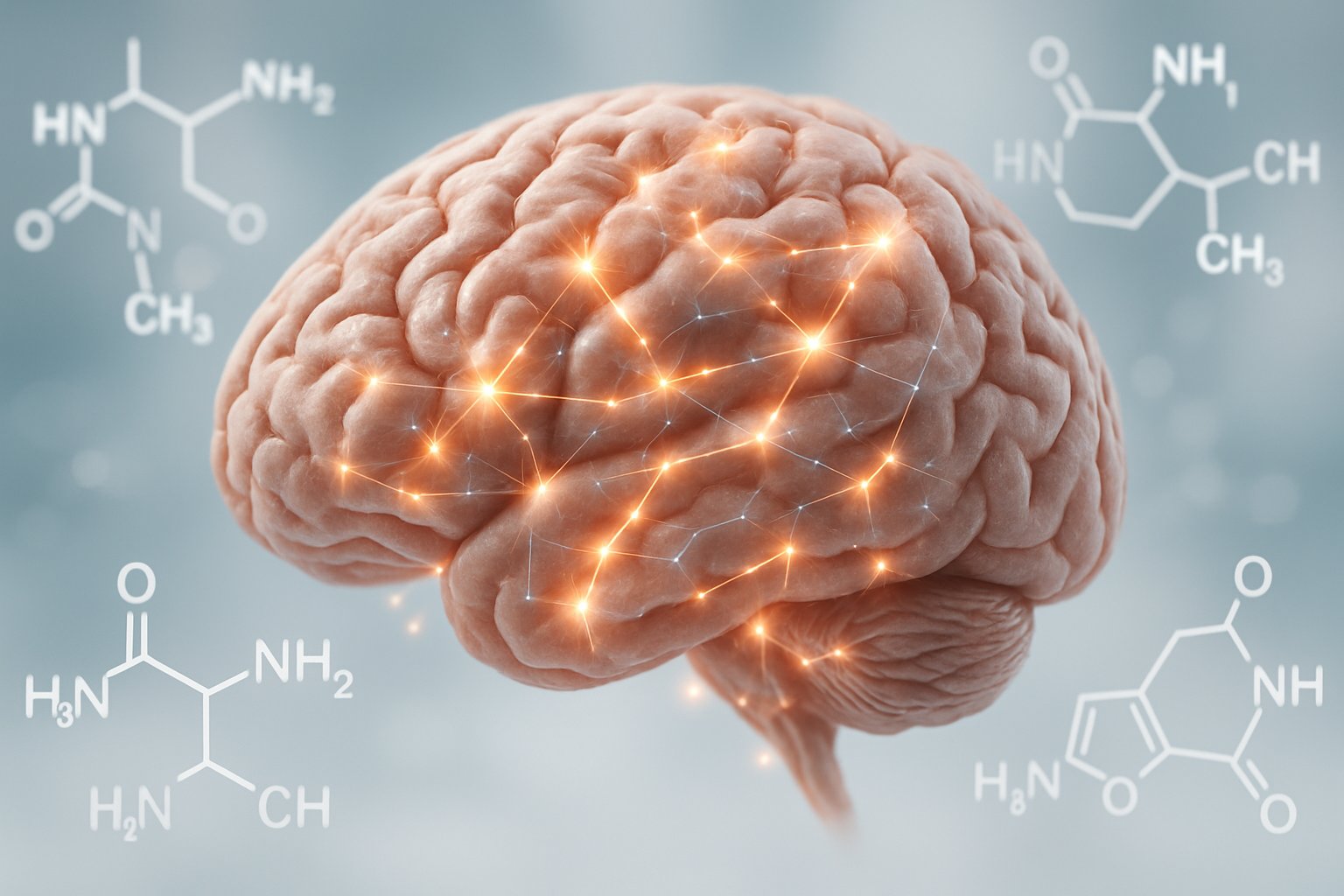
Creatine works by enhancing mitochondrial energy production and reducing harmful cellular damage. These processes directly affect how brain cells function and protect themselves from stress.
Creatine’s Role in Mitochondrial Function
Mitochondria serve as the powerhouses of brain cells. They produce ATP, which provides energy for all cellular activities. Creatine acts as an energy buffer system within these structures.
When brain cells need quick energy, creatine donates a phosphate group to ADP. This creates ATP instantly without going through the slower process of glucose breakdown. The brain uses about 20% of the body’s total energy despite being only 2% of body weight.
Key mitochondrial benefits include:
- Faster ATP regeneration during high energy demands
- Improved energy efficiency in neurons
- Better cellular function during stress periods
The brain’s energy supply improves[1] similarly to how creatine works in muscles. This enhanced energy production helps neurons communicate more effectively.
Brain cells with more available creatine can maintain normal function even when under stress. This explains why creatine shows the most benefit for people with sleep deprivation or cognitive fatigue.
Influence on Oxidative Stress and Inflammation
Oxidative stress occurs when harmful molecules called free radicals damage brain cells. This process contributes to aging and neurodegenerative diseases. Creatine helps protect against this damage through several mechanisms.
Creatine acts as a direct antioxidant by neutralizing free radicals. It also supports the brain’s natural antioxidant systems. This dual protection helps maintain healthy brain tissue over time.
Protective mechanisms include:
- Direct scavenging of harmful free radicals
- Support for glutathione production
- Reduced inflammatory signaling
The supplement helps stabilize cell membranes in neurons. This makes brain cells more resistant to damage from toxins and inflammation. Studies show that people with higher brain creatine levels have better protection against cellular stress.
Creatine also reduces inflammation markers in brain tissue. Lower inflammation helps neurons function better and may slow age-related cognitive decline.
Sources, Dosage, and Forms of Creatine
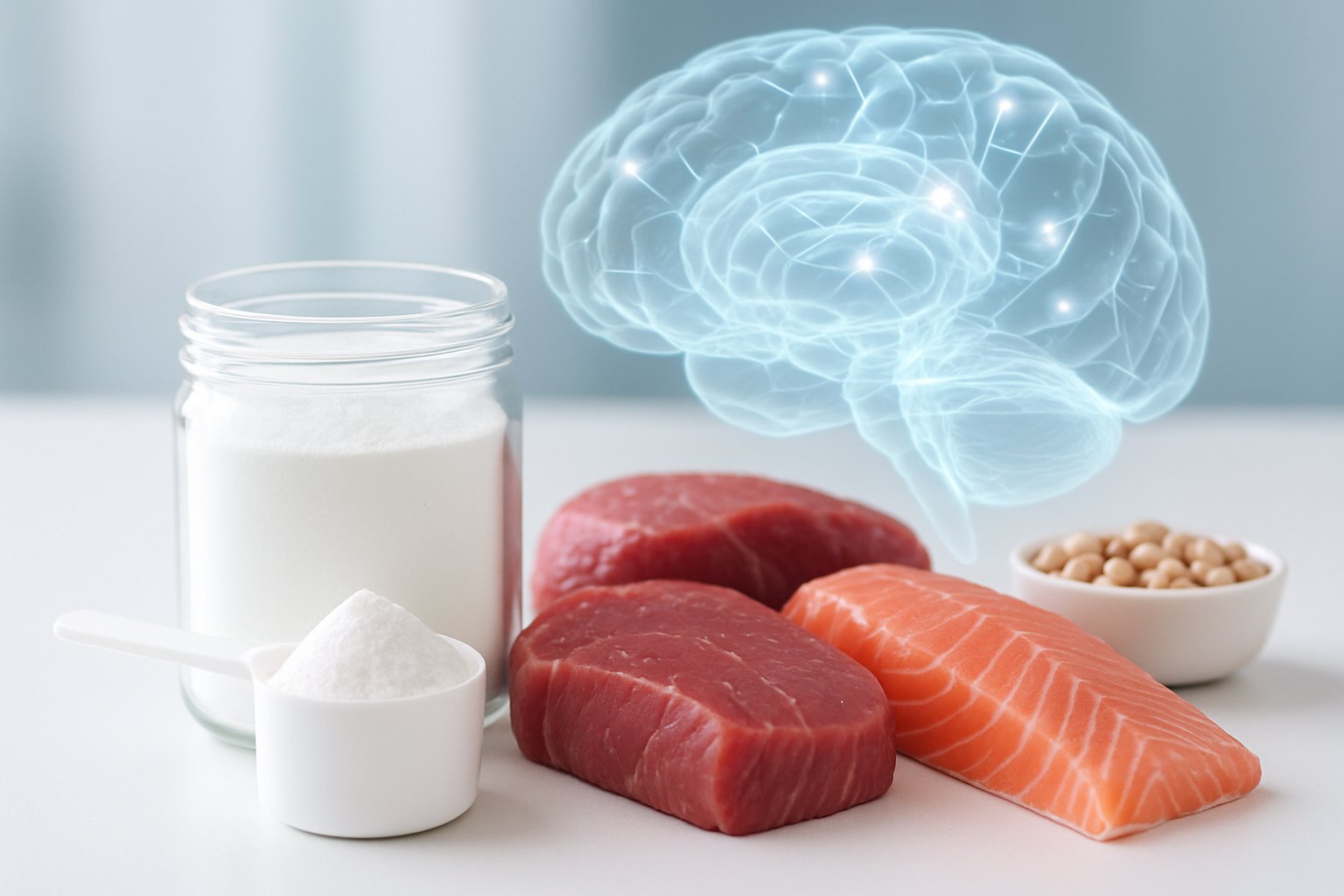
Your body naturally makes creatine, but you can also get it from food or supplements. Creatine supplements come in different forms[4], with creatine monohydrate being the most studied type.
Dietary Sources: Red Meat and Fish
Red meat and fish provide the highest amounts of natural creatine. Beef contains about 5 grams of creatine per kilogram of raw meat. Pork offers similar levels.
Fish like salmon, tuna, and cod contain 4-5 grams per kilogram. Chicken and turkey have lower amounts at 3-4 grams per kilogram.
Daily creatine from food sources:
- 6 oz steak: 1-2 grams
- 6 oz salmon: 1-1.5 grams
- 6 oz chicken breast: 0.5-1 gram
Cooking reduces creatine content by 30%. Vegetarians and vegans get very little creatine from their diets. Plant foods contain almost no creatine.
Your body makes 1-2 grams of creatine daily in your liver and kidneys. This covers basic needs but may not be enough for peak brain performance.
Creatine Supplement Types
Creatine monohydrate is the most common and well-researched form. It has the most scientific backing for both muscle and brain benefits.
Other forms include creatine HCL, buffered creatine, and creatine ethyl ester. These newer forms claim better absorption. However, they lack the research support that creatine monohydrate has.
Common supplement forms:
- Creatine monohydrate: Powder, capsules, tablets
- Creatine HCL: Claims less water retention
- Buffered creatine: May cause less stomach upset
Powder form dissolves well in water or juice. Capsules offer convenience but require more pills to reach effective doses. Most sports nutrition experts recommend sticking with creatine monohydrate.
The supplement industry markets many creatine blends. These often cost more without proven benefits over basic creatine monohydrate.
Recommended Dosage and Safety
Standard athletic doses range from 3-5 grams daily. Brain health studies use much higher amounts. Research on cognitive benefits often uses 20 grams or more[1] to ensure enough crosses into the brain.
Loading vs. maintenance:
- Loading phase: 20 grams daily for 5-7 days
- Maintenance: 3-5 grams daily
- High-dose studies: 20-35 grams single dose
High doses put strain on the kidneys[1] and are not recommended for people with kidney problems. Most healthy adults can safely take standard doses.
Take creatine with water or carbs to improve uptake. Timing does not matter much for brain benefits. Consistency matters more than perfect timing.
Side effects are rare at normal doses. Some people experience mild stomach upset or water retention. Start with smaller amounts if you have a sensitive stomach.
Broader Implications for Physical and Brain Performance
Creatine supplementation affects both physical and mental performance through its role in cellular energy production. The supplement’s dual benefits make it valuable for athletes and individuals seeking cognitive enhancement.
Connections to Muscle Growth and Physical Performance
Creatine’s primary role in sports nutrition involves boosting ATP regeneration in muscle cells. This process allows athletes to perform more repetitions during high-intensity training sessions.
The increased training volume directly supports muscle growth. When muscles can work harder for longer periods, they experience greater stress that triggers adaptation and growth.
Physical performance benefits include:
- Enhanced power output during short bursts
- Reduced fatigue between sets
- Faster recovery between training sessions
- Increased lean muscle mass over time
Research shows that creatine supplements help build strength[5] by improving the body’s ability to produce energy quickly. This effect is most noticeable during activities lasting 30 seconds or less.
The supplement works by increasing phosphocreatine stores in muscles. These stores act as a rapid energy reserve during explosive movements like sprinting or weightlifting.
Combined Cognitive and Athletic Benefits
Athletes who use creatine supplementation may experience both physical and mental advantages during competition. The brain requires significant energy during intense physical activity, especially for decision-making and coordination.
Dual benefits of creatine include:
- Improved reaction times during sports
- Better focus during long training sessions
- Enhanced mental clarity under physical stress
- Reduced cognitive fatigue after intense exercise
The same energy-boosting mechanism that helps muscles also supports brain function. This makes creatine particularly useful for sports requiring quick thinking and physical performance simultaneously.
Creatine shows better cognitive performance[1] when the brain is under stress. This applies to both mental fatigue and the stress caused by intense physical activity.
The supplement’s ability to cross the blood-brain barrier means it can directly fuel neurons. This process becomes more important during activities that tax both mental and physical systems.
Emerging Research and Future Perspectives
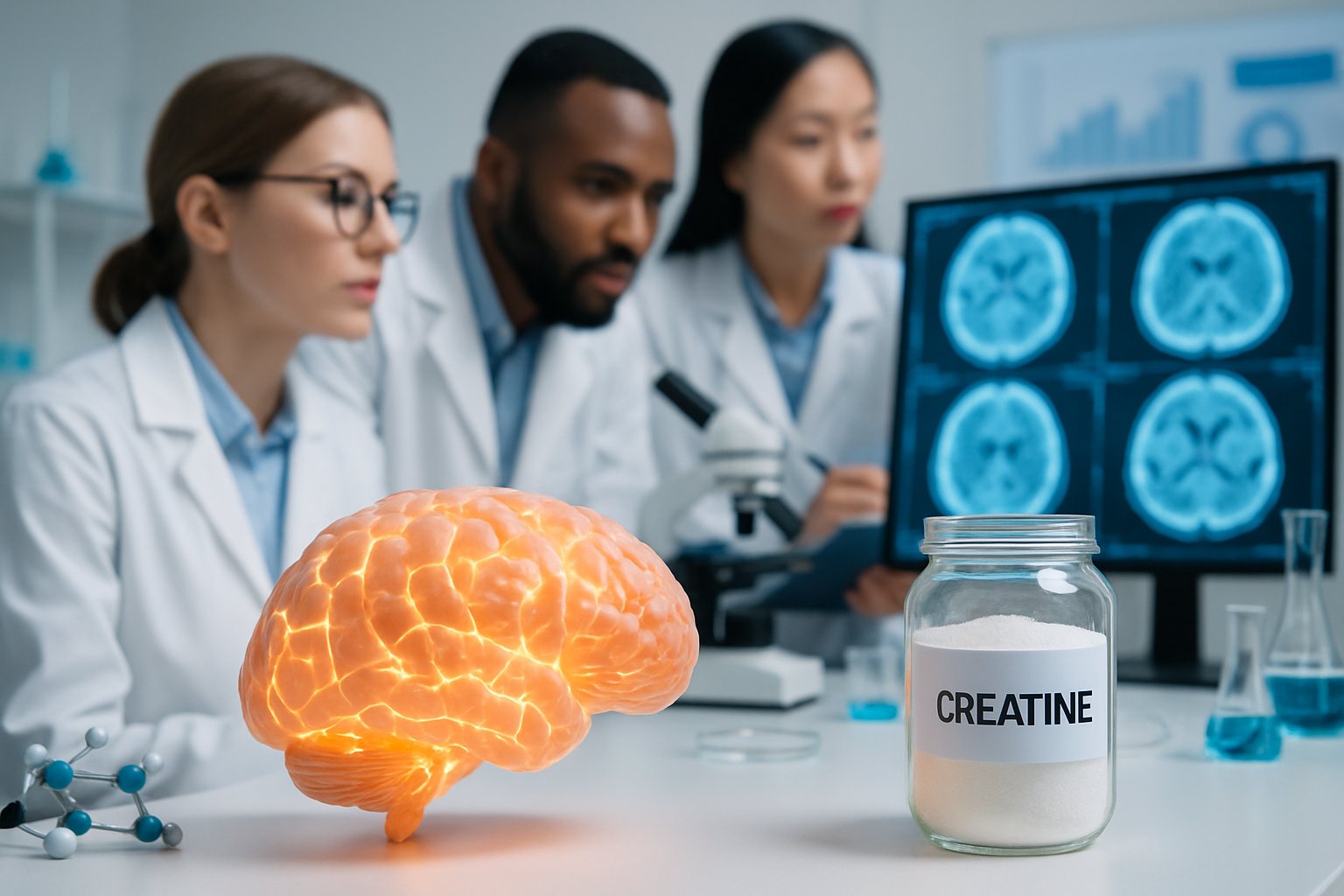
Scientists are exploring new ways creatine affects brain function, with studies showing promise for stressed and aging brains. Research continues to examine optimal dosing and long-term effects on cognitive health.
Latest Findings on Creatine and Brain Function
Recent studies reveal that creatine improves cognitive performance during sleep deprivation[1] when given as a single large dose. German researchers found that 35 grams of creatine helped tired brains perform better on cognitive tests.
Key recent discoveries include:
- Single-dose creatine can reduce fatigue-related brain changes
- Higher doses (20-35g) may be needed for brain benefits versus muscle benefits (5g)
- Creatine shows safety and cognitive improvements in Alzheimer’s patients over 8 weeks
The supplement works differently in stressed brains compared to healthy ones. A 2024 review confirmed that creatine has no significant effect on young, healthy people in normal situations.
Stressed brain conditions where creatine helps:
- Sleep deprivation
- Mental fatigue
- Aging-related cognitive decline
- Conditions limiting oxygen intake
Potential Areas for Further Investigation
Researchers are examining whether creatine can slow Alzheimer’s disease progression[1] and reduce neurodegenerative disease risk. Current studies focus on finding the right dose that helps the brain without straining the kidneys.
Scientists need to determine how much creatine actually reaches the brain. The blood-brain barrier limits how much gets through, which explains why brain studies use higher doses than muscle studies.
Priority research areas:
- Optimal dosing for cognitive benefits
- Long-term safety of high-dose creatine
- Effects on healthy aging
- Prevention of neurodegenerative diseases
Funding remains limited because creatine is inexpensive and cannot generate large profits for pharmaceutical companies. This slows research progress despite promising early results.
Frequently Asked Questions
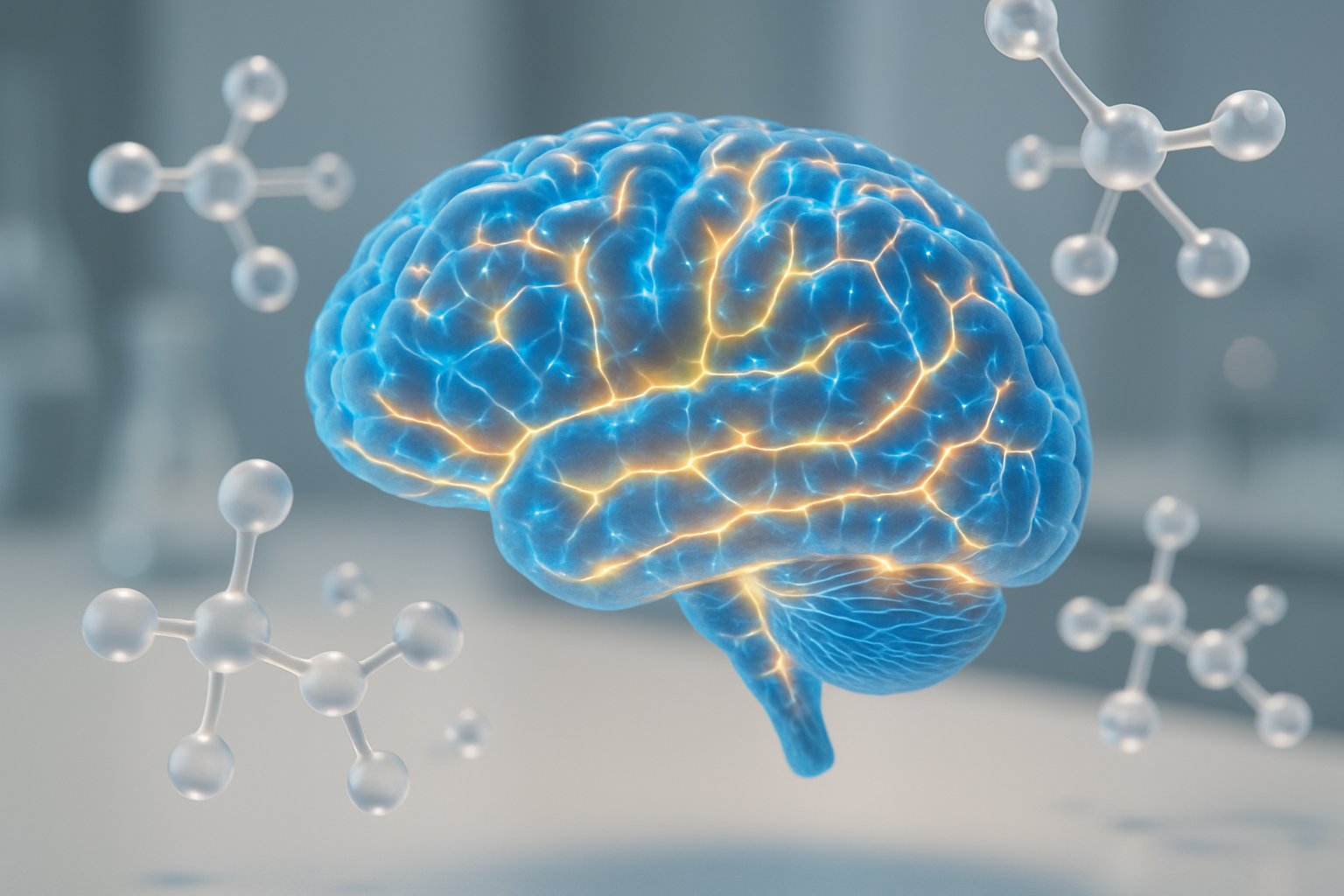
Most concerns about creatine and brain function center around safety and effectiveness. Research shows that creatine is generally safe for healthy individuals, with limited evidence of serious brain-related side effects.
Can creatine supplementation lead to brain fog or cognitive impairment?
Current research does not show that creatine causes brain fog or cognitive impairment in healthy people. Studies indicate that creatine supplementation had no significant effect on young healthy participants[1] in normal situations.
Some people may experience mild headaches when starting creatine supplements. This typically occurs due to dehydration rather than direct brain effects.
The supplement appears to help rather than harm cognitive function in people with stressed brains. Sleep-deprived individuals showed better mental performance after taking creatine.
What potential side effects might one experience in the brain due to creatine intake?
Brain-specific side effects from creatine are rare and mild. The most common issue is headaches, which usually result from inadequate water intake.
High doses above 20-30 grams may put strain on the kidneys. However, this affects kidney function rather than brain health directly.
Some users report feeling more alert or energetic. This occurs because creatine increases energy production in brain cells.
Most brain-related effects are positive rather than negative. Research shows improvements in mental fatigue and cognitive performance.
Which form of creatine is considered optimal for promoting brain health?
Creatine monohydrate is the most studied form for brain health benefits. Most research on cognitive effects uses this specific type of creatine.
Other forms like creatine hydrochloride or buffered creatine lack extensive brain research. Scientists have not proven these alternatives work better for mental function.
The brain requires creatine to cross the blood-brain barrier. Only small amounts of any creatine form can pass through this protective barrier.
Studies showing cognitive benefits typically use creatine monohydrate at doses of 20 grams daily. Lower doses may not provide the same brain effects.
Are there any documented cases of permanent brain damage associated with creatine usage?
No documented cases of permanent brain damage exist from creatine supplementation in healthy individuals. Decades of research support the safety profile of creatine for brain function.
Medical literature does not report serious brain injuries from creatine use. The supplement has been studied extensively without evidence of lasting cognitive harm.
Creatine is regarded as safe and effective[6] when taken in recommended amounts. Safety concerns focus on kidney function rather than brain damage.
People with existing kidney problems should consult doctors before taking creatine. However, this precaution relates to kidney health, not brain safety.
Is there evidence to support the role of creatine in repairing or improving brain function?
Research shows promising evidence that creatine may improve brain function in specific situations. Creatine supplementation holds potential for enhancing cognitive function during stress and fatigue[7].
Studies demonstrate benefits for people with Alzheimer’s disease. A pilot study found that 20 grams daily for eight weeks improved cognitive function in participants.
Sleep-deprived individuals showed better mental performance after taking creatine. The supplement helped reduce fatigue-related brain changes.
Older adults and people with certain health conditions may see the most benefit. Creatine appears most useful for people with stressed brains[1].
What are the common adverse effects associated with long-term creatine supplementation?
Long-term creatine use shows few adverse effects related to brain function. Most side effects involve the digestive system or muscles rather than cognitive problems.
Common issues include stomach upset, diarrhea, and muscle cramping. These effects typically resolve with proper dosing and hydration.
Weight gain from water retention is normal and expected. This occurs because creatine pulls water into muscle cells.
Kidney strain may occur with very high doses over long periods. People should stick to recommended doses and drink plenty of water during supplementation.
References
- studies show creatine has no significant effect on young healthy people. https://www.verywellhealth.com/can-creatine-boost-cognition-11750428 Accessed October 26, 2025
- Is Creatine A Brain Health Supplement? What A New Study Reveals. https://www.mindbodygreen.com/articles/this-popular-supplement-helps-keep-your-brain-sharp-study-shows Accessed October 26, 2025
- Creatine for Mental Health: Benefits in Depression, Bipolar Disorder & Cognitive Function — Psychiatry & Psychotherapy Podcast. https://www.psychiatrypodcast.com/psychiatry-psychotherapy-podcast/episode-238-creatine-mental-health-benefits Accessed October 26, 2025
- Creatine benefits, dosage, and side effects. https://examine.com/supplements/creatine/ Accessed October 26, 2025
- Creatine: What It Does, Benefits, Supplements & Safety. https://my.clevelandclinic.org/health/treatments/17674-creatine Accessed October 26, 2025
- Creatine is regarded as safe and effective. https://www.eatingwell.com/is-creatine-bad-for-you-11806099 Accessed October 26, 2025
- When to Take Creatine for Brain Health: Understanding Timing and Benef – CYMBIOTIKA. https://cymbiotika.com/blogs/brain-health/when-to-take-creatine-for-brain-health-understanding-timing-and-benefits Accessed October 26, 2025
